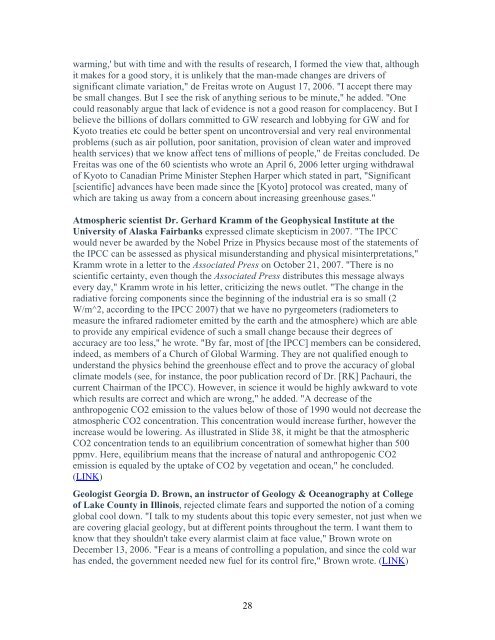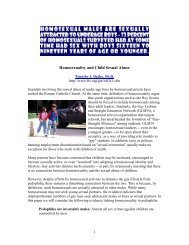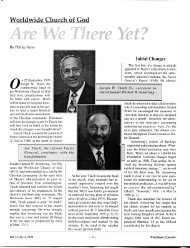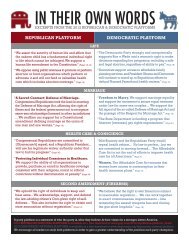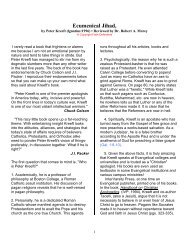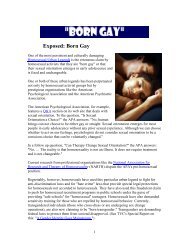U.S. Senate Report: Over 400 Prominent Scientists Disputed ... - NJIAT
U.S. Senate Report: Over 400 Prominent Scientists Disputed ... - NJIAT
U.S. Senate Report: Over 400 Prominent Scientists Disputed ... - NJIAT
You also want an ePaper? Increase the reach of your titles
YUMPU automatically turns print PDFs into web optimized ePapers that Google loves.
warming,' but with time and with the results of research, I formed the view that, although<br />
it makes for a good story, it is unlikely that the man-made changes are drivers of<br />
significant climate variation," de Freitas wrote on August 17, 2006. "I accept there may<br />
be small changes. But I see the risk of anything serious to be minute," he added. "One<br />
could reasonably argue that lack of evidence is not a good reason for complacency. But I<br />
believe the billions of dollars committed to GW research and lobbying for GW and for<br />
Kyoto treaties etc could be better spent on uncontroversial and very real environmental<br />
problems (such as air pollution, poor sanitation, provision of clean water and improved<br />
health services) that we know affect tens of millions of people," de Freitas concluded. De<br />
Freitas was one of the 60 scientists who wrote an April 6, 2006 letter urging withdrawal<br />
of Kyoto to Canadian Prime Minister Stephen Harper which stated in part, "Significant<br />
[scientific] advances have been made since the [Kyoto] protocol was created, many of<br />
which are taking us away from a concern about increasing greenhouse gases."<br />
Atmospheric scientist Dr. Gerhard Kramm of the Geophysical Institute at the<br />
University of Alaska Fairbanks expressed climate skepticism in 2007. "The IPCC<br />
would never be awarded by the Nobel Prize in Physics because most of the statements of<br />
the IPCC can be assessed as physical misunderstanding and physical misinterpretations,"<br />
Kramm wrote in a letter to the Associated Press on October 21, 2007. "There is no<br />
scientific certainty, even though the Associated Press distributes this message always<br />
every day," Kramm wrote in his letter, criticizing the news outlet. "The change in the<br />
radiative forcing components since the beginning of the industrial era is so small (2<br />
W/m^2, according to the IPCC 2007) that we have no pyrgeometers (radiometers to<br />
measure the infrared radiometer emitted by the earth and the atmosphere) which are able<br />
to provide any empirical evidence of such a small change because their degrees of<br />
accuracy are too less," he wrote. "By far, most of [the IPCC] members can be considered,<br />
indeed, as members of a Church of Global Warming. They are not qualified enough to<br />
understand the physics behind the greenhouse effect and to prove the accuracy of global<br />
climate models (see, for instance, the poor publication record of Dr. [RK] Pachauri, the<br />
current Chairman of the IPCC). However, in science it would be highly awkward to vote<br />
which results are correct and which are wrong," he added. "A decrease of the<br />
anthropogenic CO2 emission to the values below of those of 1990 would not decrease the<br />
atmospheric CO2 concentration. This concentration would increase further, however the<br />
increase would be lowering. As illustrated in Slide 38, it might be that the atmospheric<br />
CO2 concentration tends to an equilibrium concentration of somewhat higher than 500<br />
ppmv. Here, equilibrium means that the increase of natural and anthropogenic CO2<br />
emission is equaled by the uptake of CO2 by vegetation and ocean," he concluded.<br />
(LINK)<br />
Geologist Georgia D. Brown, an instructor of Geology & Oceanography at College<br />
of Lake County in Illinois, rejected climate fears and supported the notion of a coming<br />
global cool down. "I talk to my students about this topic every semester, not just when we<br />
are covering glacial geology, but at different points throughout the term. I want them to<br />
know that they shouldn't take every alarmist claim at face value," Brown wrote on<br />
December 13, 2006. "Fear is a means of controlling a population, and since the cold war<br />
has ended, the government needed new fuel for its control fire," Brown wrote. (LINK)<br />
28


